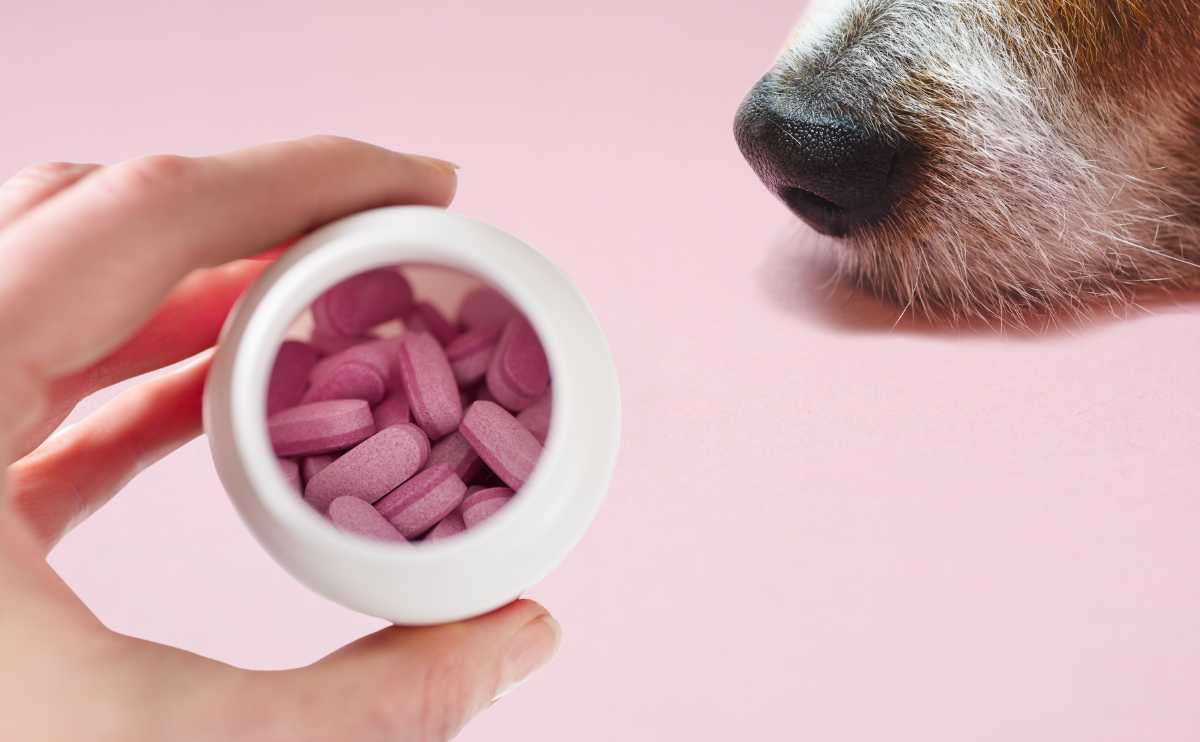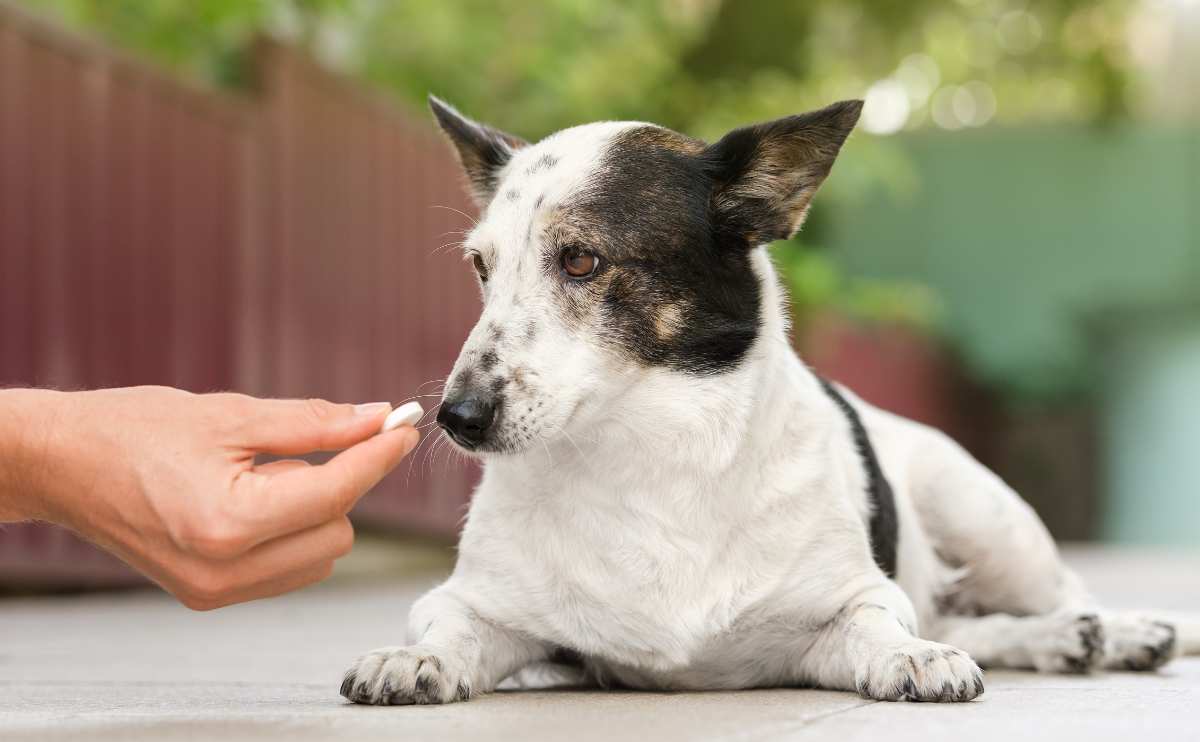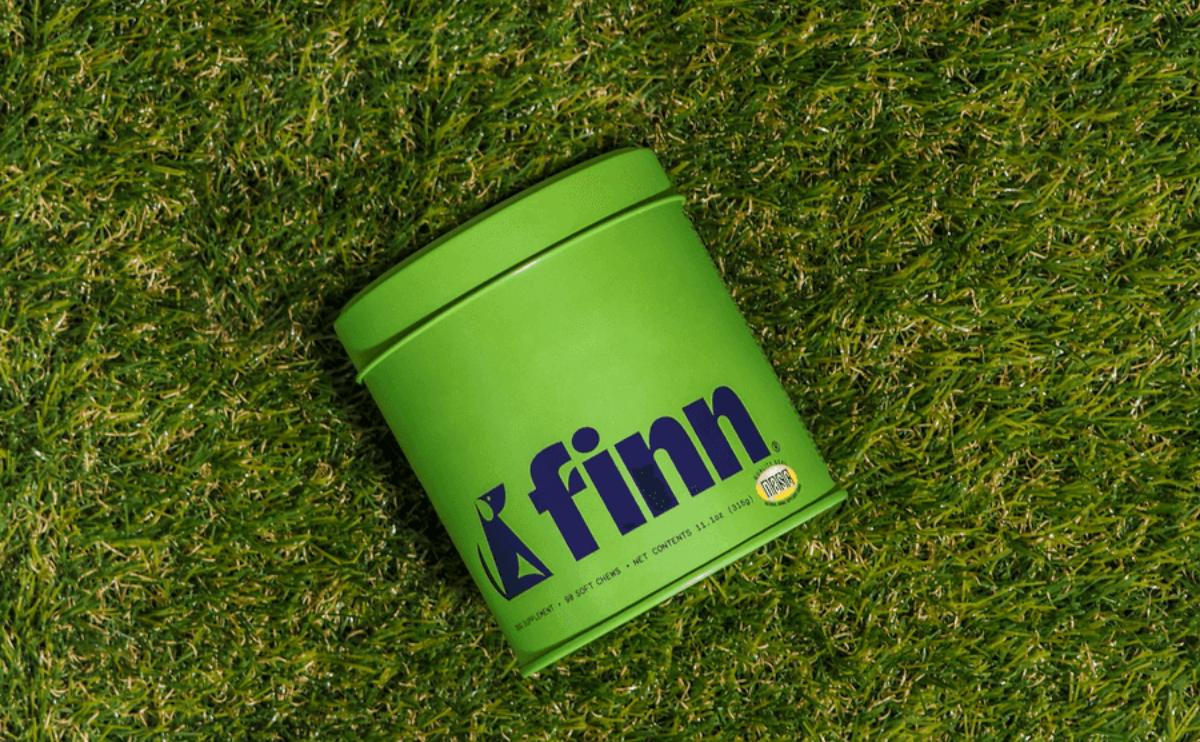When you purchase through links on our site, we may earn a commission. Here’s how it works.
Is salmon oil good for dogs? The omega-3 fatty acids in salmon oil have a ton of health benefits for our canine companions. And it’s extremely safe for most dogs as long as you use a quality-tested formula. See our top picks for the best salmon oil for dogs, the multiple benefits, and some cautionary tips about using this supplement.
| Best Overall | Most Popular | With CBD | Budget |
|---|---|---|---|
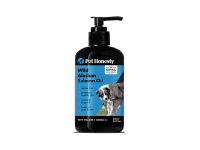 | 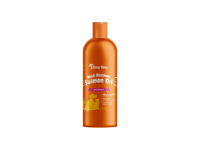 |  |  |
| Pet Honesty | Zesty Paws | Honest Paws | Dogswell |
| Visit Website | View on Chewy | Visit Website | View on Chewy |
| Read Review | Read Review | Read Review | Read Review |
- Benefits Of Salmon Oil For Dogs
- Is Salmon Oil Safe For Dogs?
- Best Salmon Oil For Dogs
- Our Personal Experience With Salmon Oil For Dogs
- How Much Salmon Oil Should I Give My Dog?
- What Are The Risk Factors & Side Effects Of Salmon Oil For Dogs?
- Frequently Asked Questions
- Best Dog Allergy And Joint Supplements
- Why Trust Canine Journal?
Benefits Of Salmon Oil For Dogs
When looking for the best salmon oil for your pup, you want to ensure it contains both eicosapentaenoic acid (EPA) and docosahexaenoic acid (DHA), the most beneficial omega-3 fatty acids. So, what does salmon oil do for dogs? Fish oil for dogs and cats has been studied more than most types of pet supplements. Here are a few of the many health benefits for dogs.
- Skin allergies: moisturizes the skin and reduces inflammation and itchiness.
- Decreases shedding & improves coat health.
- Supports immune and brain health and may improve cognitive function.
- Joint problems and injuries: reduces inflammation and pain and improves mobility.
- Lowers blood pressure.
- May decrease the risk of certain cancers.
- Heart disease: vets often recommend omega-3 fatty acids for dogs with congestive heart failure and to protect against irregular heartbeats (arrhythmia).
- Slows the progression of chronic kidney disease.
Another benefit of salmon oil is that it helps balance out omega-6 fatty acids in their diet. While dogs need some omega-6, many commercial dog foods, especially those containing a lot of grains, corn-fed meat, or refined oils, contain too much omega-6. And excessive amounts of omega-6 fatty acids can cause chronic inflammation. But giving your pup salmon oil can solve this problem.
Is Salmon Oil Safe For Dogs?
Understandably, many pet owners are concerned about harmful levels of mercury and other heavy metals and toxins in fish oil. And this is a definite problem with some low-quality oils because the FDA doesn’t regulate pet supplements.
Therefore, it’s extremely important to choose a salmon oil from a manufacturer who has their products independently tested for purity. Also, look for pet supplements with the National Animal Supplement Council (NASC) Quality Seal, which is given to brands that meet this organization’s strict quality requirements.
Best Salmon Oil For Dogs
We’ve chosen our top picks based on several factors, including quality and purity, sustainable sourcing, company reputation, pricing, customer feedback, and more.
Best Overall: Pet Honesty Wild Alaskan Salmon Oil
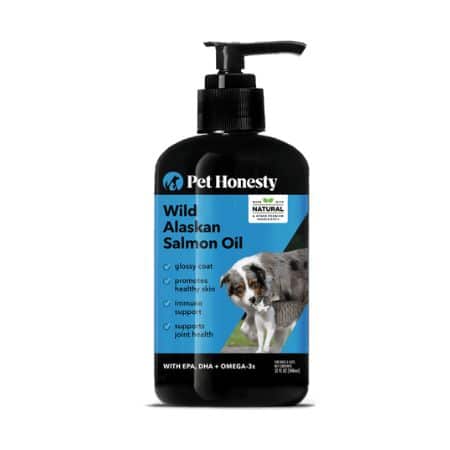
View on Amazon | View on Chewy | View on Pet Honesty
Pet Honesty’s salmon oil is an excellent value if you sign up for auto-shipping. This oil is sourced from a Marine Stewardship Council (MSC)-certified fishery in Alaska. The MSC is an international nonprofit whose mission is to end overfishing and ensure that seafood is caught sustainably.
One teaspoon contains around 423mg of EPA and 465mg of DHA (total omega-3s of 1,227 mg), so it’s more potent than Zesty Paws and will last longer. Made in the USA, this salmon oil is 100% all-natural with no added ingredients and has the NASC Quality Seal of approval. Pet Honesty offers a 30-day money-back guarantee. The only downside is that several customers complain that the pump top is leaky.
Recommended Dosage
Add one pump (2ml) for every 25 lbs of your dog or cat’s weight per day.
Price
You can subscribe for auto-shipping and save 20% off the following price.
- $36.99 ($1.16 / Fl Oz) (32 fl oz)
In-Depth Pet Honesty Review
Most Popular: Zesty Paws Wild Alaskan Salmon Oil
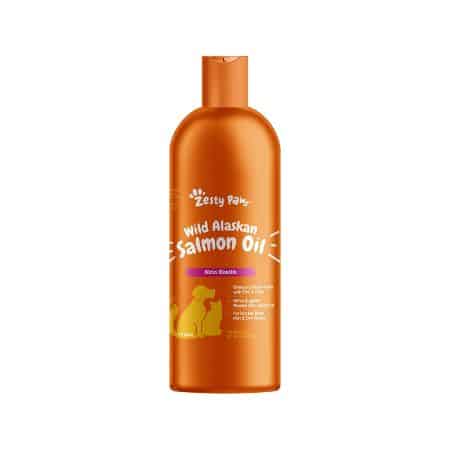
View on Amazon | View on Chewy
Zesty Paws is the bestselling salmon oil on Amazon, Chewy, and other sites for its combination of high-quality, safe ingredients, and competitive pricing. This oil is extracted from wild-caught Alaskan salmon, and one teaspoon contains 850mg of omega-3 fatty acids (with DHA and EPA). Made in the USA, it carries the NASC Quality Seal and contains only pure salmon oil and mixed tocopherols (a natural preservative that’s a combination of different sources of vitamin E).
It comes in a pump-top bottle that’s easy to squirt on your pup’s food (or your kitty’s food). And Zesty Paws offers a 100% satisfaction guarantee. Just keep in mind when choosing a size that Zesty Paws recommends you store it in your refrigerator after opening it.
Recommended Dosage
Give one teaspoon (approx. two pumps) for every 20 pounds of body weight once per day. Amounts can be split between AM and PM.
Price
In-Depth Zesty Paws Review
Best With CBD: Honest Paws Wild Alaskan Salmon Oil + CBD
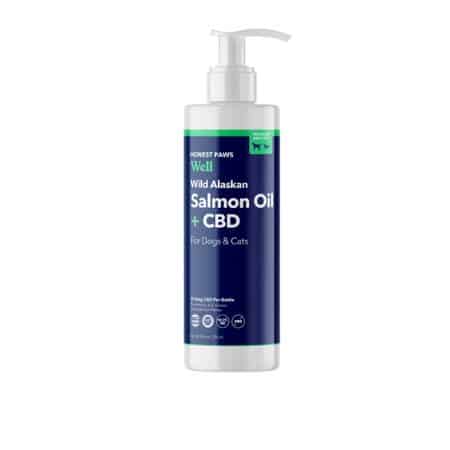
If you want to give your furry friend the health benefits of both omega-3s and CBD oil, this product may be the perfect solution. Cannabidiol (CBD) can help ease chronic pain and inflammation, anxiety and stress, and several other health issues (see the benefits of CBD for dogs to learn more). Honest Paws is a high-quality and well-trusted manufacturer of CBD pet products.
All of Honest Paws’ products are made in the USA and third-party tested for purity, and the company also meets NASC’s quality requirements. Per two pumps (3.2ml), this product contains 2.9g of oil extracted from wild-caught Alaskan salmon and 4.2mg of CBD from organic full-spectrum hemp oil. The only other ingredients are MCT oil and mixed tocopherols. Honest Paws has a 30-day money-back guarantee.
Recommended Dosage
- Under 25 lbs: 2 pumps daily
- 25-50 lbs: 4 pumps daily
- Over 50 lbs: 6 pumps daily
Price
If you subscribe for auto-shipping, you can save 15% off the following price.
- $34.97 (8 fl oz)
In-Depth Honest Paws Review
Best Budget: Dogswell Wild Alaskan Salmon Oil
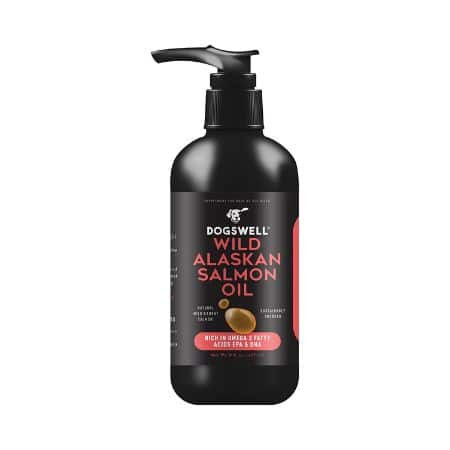
View on Amazon | View on Chewy
Salmon oil can be pricey, especially if you have a large dog. But we’ve found an excellent budget option in this Dogswell product. Made in the USA, this oil is extracted from sustainably caught wild salmon, each teaspoon contains 1,227mg of total omega-3s (423mg of EPA and 465 mg of DHA). The only other ingredient is mixed tocopherols. Dogswell also meets NASC’s strict quality requirements. This product also gets some complaints about a leaky pump.
Recommended Dosage
- Up to 10 lbs: ½ pump or ⅛ tsp
- 11-20 lbs: 1 pump or ½ tsp
- 21-30 lbs: 1.5 pumps or ¾ tsp
- 31-40 lbs: 2 pumps or 1 tsp
- + 10lbs: + ½ pump or ½ tsp
Price
- Starting at Check Amazon for availability (8 oz)
Our Personal Experience With Salmon Oil For Dogs
I work at a health food store that also sells supplements for pets. Fish oil, particularly salmon oil, is a popular choice for dog parents who want to improve their pet’s overall health.
Fish oil supports a dog’s heart, joints, eyes, skin, coat, and more. Salmon oil also naturally contains a carotenoid called astaxanthin, which is an antioxidant that boosts immune function and protects from cellular damage.
I love that people are focusing on their pet’s well-being, but I always emphasize that quality is everything when it comes to fish oils. Poor-quality salmon oil can do more damage than not supplementing at all.
When shopping for fish oil, focus on freshness, purity, and sourcing. Fresh fish oil reduces the risk of free radical formation. Aside from the fishy taste and smell, ingesting rancid oils may create oxidative stress, thus damaging healthy cells and creating inflammation.
The second factor is purity. Quality companies exceed standards for the allowance of heavy metals and toxic chemicals in their product. Pollutants like dioxins and PCBs can cause a number of health issues, including liver problems and skin conditions. Check to ensure the brand uses third-party testing to ensure purity.
Finally, you want to consider where the product is sourced. Generally, wild-caught fish tend to deliver a better nutrient profile than farm-raised fish. Just make sure the fish are sustainably sourced to minimize harmful environmental impacts.
– Tara Maurer, Retail Health Consultant & Pet Owner
How Much Salmon Oil Should I Give My Dog?
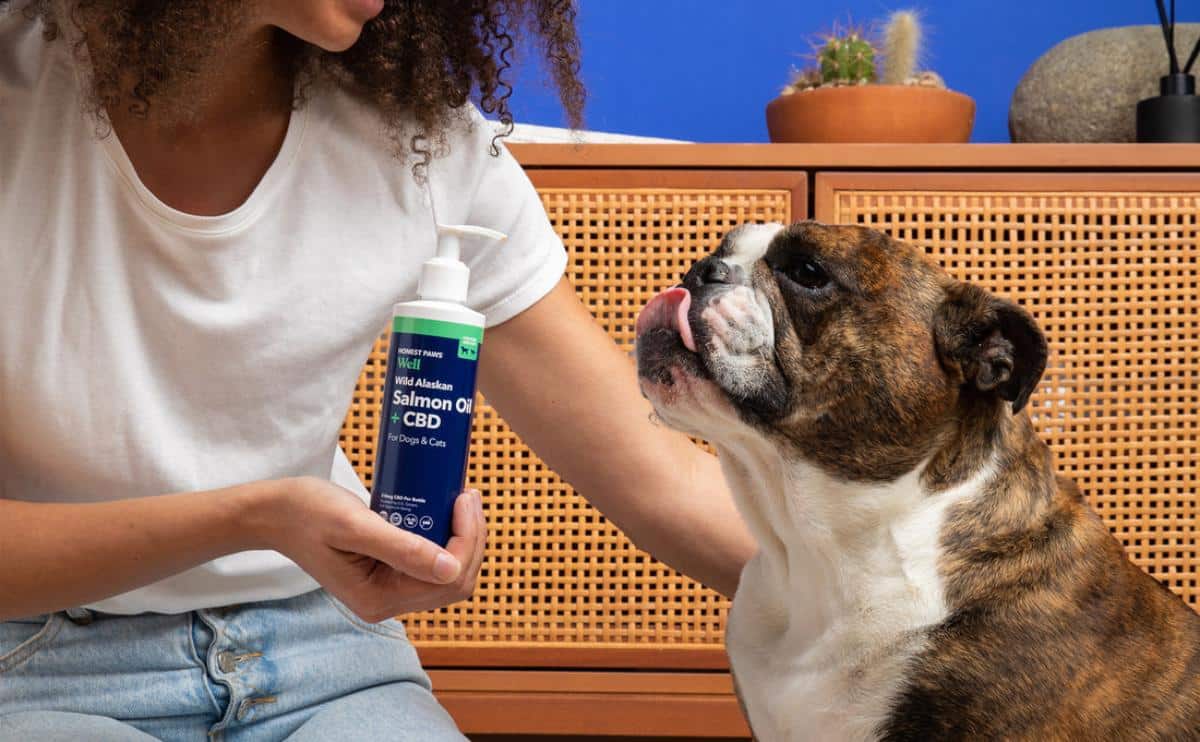
How much salmon oil for dogs per day depends on several factors, including your pup’s weight, the brand of oil (i.e., the levels of omegas, EPA, and DHA), the presence of health conditions, and more. It also depends on your pup’s diet because some dog foods already have omega-3 fatty acids in them. So, check the list of ingredients in your dog food. If it contains salmon or fish or is fortified with omega-3s, you should consult your veterinarian to determine how much salmon oil to give your pup as a supplement. Too much fish oil can cause side effects.
Even if your pup’s food doesn’t contain omega-3 fatty acids, it’s a good idea to get the okay from your vet before giving your dog any type of supplement. You should be fine as long as you follow your product’s dosage recommendations unless your vet has other guidance.
What Are The Risk Factors & Side Effects Of Salmon Oil For Dogs?
Fish oil is relatively safe, but some conditions could present risks, including dogs with bleeding disorders, diabetes, a history of pancreatitis, and diarrhea. For these dogs, it’s important to discuss fish oil supplementation with your vet.
In healthy dogs, fish oil is considered very safe. Potential side effects, which typically occur with doses that are too high, include vomiting, diarrhea, slow wound healing, an oily coat, and fishy breath. Also, if your dog is on a grain-based diet, taking salmon oil daily over a long period may cause a vitamin E deficiency. Check with your vet to see if you should be giving your pup a vitamin E supplement as well.
Frequently Asked Questions
Here are some additional questions we see frequently from our readers about salmon oil. Don’t see yours here? Ask us in our comments.
Salmon Oil vs Fish Oil For Dogs: What’s The Difference?
Both oils are excellent sources of omega-3 fatty acids, but salmon oil usually has higher levels and is better absorbed by the body. Products labeled “fish oil” or “omega-3” contain oil extracted from multiple wild-caught fish (e.g., herring, pollock, etc.), and it may or may not contain salmon. Typically, salmon-free fish oil has less of a fishy odor and taste than salmon oil. See our reviews of the best fish oil for dogs if you’d prefer an odorless option.
What Does Salmon Oil Do For Dogs With Joint Pain?
Salmon oil is a powerhouse supplement for aching pups because it contains the omega-3 fatty acids EPA and DHA, which reduce the inflammation associated with joint pain from such conditions as arthritis and hip dysplasia. Dogs can’t make their own omega-3 fatty acids, so it’s an important part of their diet.
Is Salmon Oil Good For Dogs’ Itchy Skin?
Many pup owners find a lot of success with a daily salmon oil supplement to relieve their dog’s itchy skin. DHA and EPA found in salmon oil help reduce skin inflammation and itchiness. These omega-3s also moisturize the skin, which helps protect it from allergens such as dust, pollen, etc.
Is Salmon Oil For Humans Safe For Dogs?
Pure salmon oil (without any other ingredients) that’s made for human consumption could be safe for your pup. But you should consult your vet to ensure the product you’re considering is okay. Your vet can also determine the safe dosage.
Best Dog Allergy And Joint Supplements
If you’re considering salmon oil to relieve your dog’s itchy skin or ease joint pain from arthritis, you may want to check out some other top supplements formulated specifically for these conditions. See our top picks for the best dog allergy supplements and the best joint supplements for dogs. You may find a better solution for your pup’s issues or a complement to salmon oil.
Why Trust Canine Journal?
Over the last 10 years, Sally has researched and reviewed hundreds of different health supplements for dogs. She’s an expert at analyzing supplements based on current scientific studies for the most beneficial ingredients for our pups. She has a dog named Tiny and is part of a team of dog specialists at Canine Journal who have over a decade of experience in researching, testing, and writing about everything you need to know to keep your pup healthy and happy.
Tagged With: Comparison, Supplements